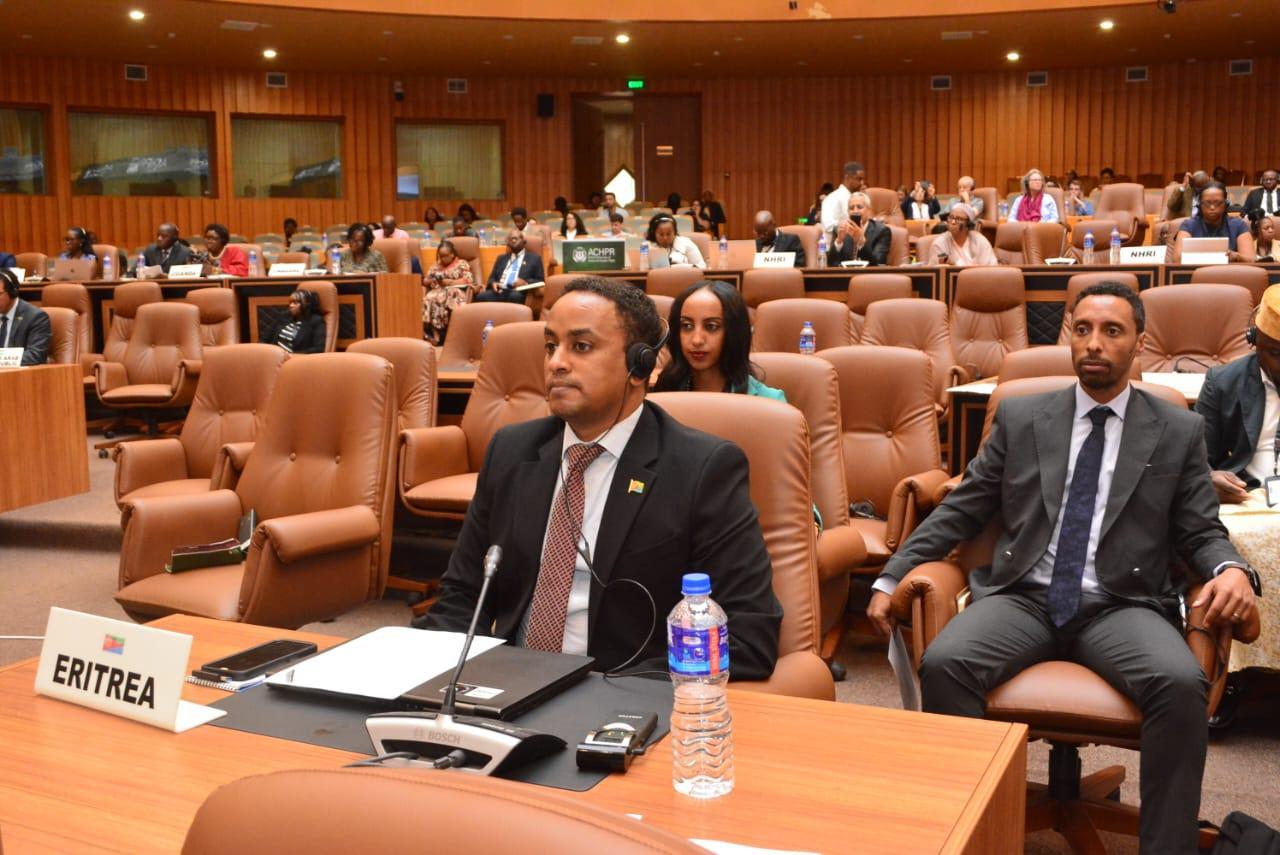
Africa-Press – Eritrea. Statement by
The Delegation of the State of Eritrea
at the
83rd Ordinary Session of the African Commission on Human and Peoples’ Rights (ACHPR)
02-22 May 2025,
On agenda item 3. “Human Rights Situation in Africa”
03 May 2025
Banjul, The Gambia
Mr. Chairperson,
It gives me a great pleasure to address the 83rd Ordinary Session of the ACHPR.
Typically, under the agenda item addressing ‘The Situation of Human Rights in Africa’ Member States share progress achieved and challenges faced in the promotion and protection of human rights in their respective countries. This time around, my delegation has opted to use this agenda item to share its views on the unfolding structural transformation at the global and continental levels that necessitate the ACHPR, and the AU in general, to act proactively with the aim of readjusting ideas, policies and actions aimed at promoting the long-term interests of our continent. My delegation will share, under the other thematic agenda items, the efforts Eritrea is making the progress registered in safeguarding the human rights of its population.
The international system is going through rapid realignment, and the uni-polar power structure is in a state of transition or flux. Consequently, the core ideas that underpinned the fading system are no longer accepted as the only options. In the realm of human rights, those who once claimed to be its guardians have often overlooked egregious atrocities committed by their allies.
In the view of this delegation, now is the opportune time for Africa to assert ownership and control over its human rights agenda; align its human rights priorities with that of the broader continental agenda; and for countries of the continent to reassert their role as the primary actors in the protection and promotion of the human rights of their populations.
Mr. Chairperson,
The universality and indivisibility of human rights is a widely acceptable principle. Furthermore, as underscored in the preamble of the ACHPR, member states of the AU pledged to take into consideration “the virtues of their historical tradition and the values of African civilization which should inspire and characterize their reflection on the concept of human and peoples’ rights.” In reality, however, the global human rights architecture fails to recognize African countries as equal stakeholders.
Over the last several decades, the discourse on human rights was framed in a way that scorns African countries for their shortcomings; naming and shaming them by instrumentalizing selected multilateral mechanisms, unilateral annual reports, NGO statements and sensational media reports. Indeed, African countries are not held accountable solely through the normative assessment procedures set out in the international treaties. It is commonplace to observer countries who claim ownership of ‘human rights values’ feel entitled to judge whimsically the performance of African countries at every opportunity they get.
It is worth mentioning that the recent disclosure by the US Government on the financing of non-governmental organizations working in ‘human rights advocacy’ has substantiated the long held views by many sceptics that the primary role of many of these organizations is to provide cover for the political agendas of the financers, and to amplify the talking points prepared by the funders.
Taking this into account, it is important to underscore that the principle of sovereign equality of states remains relevant in the realm of human rights. External entities should discard their paternalistic attitude and that the discourse on human rights be centered on mutual respect and constructive dialogue.
Mr. Chairperson,
The Banjul Charter is unique in its emphasis on people’s rights. The Charter also makes strong emphasis on the right to development. As enshrined in its preamble, the Charter reflected the consensus of the time by paying “particular attention to the right to development and that civil and political rights cannot be dissociated from economic, social and cultural rights in their conception as well as universality and that the satisfaction of economic, social and cultural rights is a guarantee for the enjoyment of civil and political rights”. These unique aspects seem to have gradually faded under pressure from external entities that prioritize individual rights and ridicule group rights; focus on civil and political rights at the expense of social, economic and cultural rights; try to steer the discourse to fashionable concepts relevant to increasingly smaller portions of society, over basic principles that impact the lives of the overwhelming majority of the population.
In this regard, it is our considered view that the human rights architecture at the continental level has to be recalibrated to give attention to people’s rights – including social economic and cultural rights – on an equal basis as individual and civil and political rights.
Mr. Chairperson,
It is crucial to underscore that African countries shoulder the primary responsibility for the promotion and protection of human rights of their population. The priority of the human rights architecture should reflect the priority of the overwhelming majority of African population to live a life of dignity through self-reliant societal efforts.
The promotion and protection of human rights requires long term efforts, and that it is filled with challenges, complexities and setbacks along the way. Thus assessments on the fulfillment of human rights objectives have to take into consideration national, continental and global objective situations. Equally important is that the human rights agenda should be viewed as part and parcel of the broader nation building process.
Mr. Chairperson,
To conclude, my delegation wished to humbly share, with this session, the above points motivated by the desire to contribute to the discussion aimed at ensuring that the continental human rights architecture makes use of the opportunity provided by the fast-changing international system to craft a truly Africa-owned, Africa-controlled continental human rights architecture that prioritizes the needs and desires of the majority of the African population; and that is capable of effecting positive changes primarily by utilizing domestic capacity.
Thank you!
For More News And Analysis About Eritrea Follow Africa-Press






